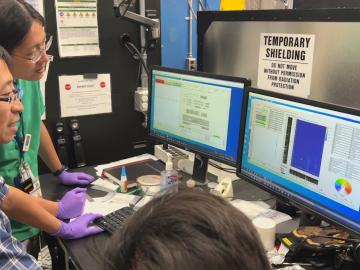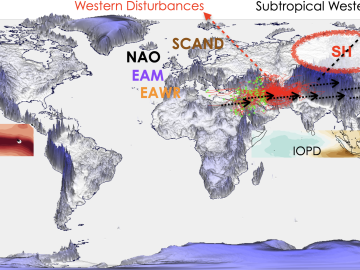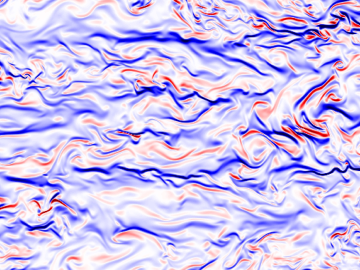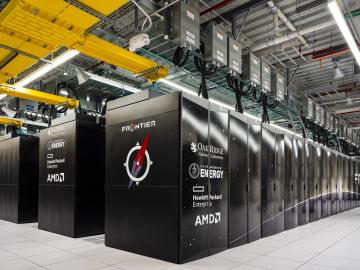
Filter News
Area of Research
- (-) Neutron Science (47)
- (-) Nuclear Science and Technology (10)
- (-) Supercomputing (90)
- Advanced Manufacturing (8)
- Biological Systems (2)
- Biology and Environment (104)
- Biology and Soft Matter (1)
- Computational Biology (2)
- Computational Engineering (3)
- Computer Science (8)
- Electricity and Smart Grid (1)
- Energy Science (87)
- Functional Materials for Energy (1)
- Fusion and Fission (8)
- Fusion Energy (2)
- Isotope Development and Production (1)
- Isotopes (11)
- Materials (99)
- Materials Characterization (1)
- Materials for Computing (16)
- Materials Under Extremes (1)
- Mathematics (1)
- National Security (28)
- Quantum information Science (1)
- Sensors and Controls (1)
- Transportation Systems (1)
News Topics
- (-) Artificial Intelligence (40)
- (-) Big Data (23)
- (-) Bioenergy (14)
- (-) Biomedical (30)
- (-) Materials Science (36)
- (-) Security (7)
- (-) Space Exploration (10)
- 3-D Printing/Advanced Manufacturing (13)
- Advanced Reactors (12)
- Biology (16)
- Biotechnology (2)
- Buildings (4)
- Chemical Sciences (7)
- Clean Water (2)
- Composites (1)
- Computer Science (100)
- Coronavirus (19)
- Critical Materials (3)
- Cybersecurity (10)
- Energy Storage (14)
- Environment (29)
- Exascale Computing (26)
- Fossil Energy (1)
- Frontier (33)
- Fusion (10)
- Grid (5)
- High-Performance Computing (44)
- Hydropower (1)
- Isotopes (7)
- Machine Learning (17)
- Materials (28)
- Mathematics (2)
- Microscopy (8)
- Molten Salt (5)
- Nanotechnology (19)
- National Security (8)
- Neutron Science (123)
- Nuclear Energy (41)
- Partnerships (1)
- Physics (18)
- Polymers (3)
- Quantum Computing (20)
- Quantum Science (30)
- Simulation (16)
- Software (1)
- Summit (43)
- Transportation (10)
Media Contacts

The Department of Energy’s Office of Science has selected three ORNL research teams to receive funding through DOE’s new Biopreparedness Research Virtual Environment initiative.

Neutron experiments can take days to complete, requiring researchers to work long shifts to monitor progress and make necessary adjustments. But thanks to advances in artificial intelligence and machine learning, experiments can now be done remotely and in half the time.

ORNL hosted its fourth Artificial Intelligence for Robust Engineering and Science, or AIRES, workshop from April 18-20. Over 100 attendees from government, academia and industry convened to identify research challenges and investment areas, carving the future of the discipline.

Wildfires have shaped the environment for millennia, but they are increasing in frequency, range and intensity in response to a hotter climate. The phenomenon is being incorporated into high-resolution simulations of the Earth’s climate by scientists at the Department of Energy’s Oak Ridge National Laboratory, with a mission to better understand and predict environmental change.

As extreme weather devastates communities worldwide, scientists are using modeling and simulation to understand how climate change impacts the frequency and intensity of these events. Although long-term climate projections and models are important, they are less helpful for short-term prediction of extreme weather that may rapidly displace thousands of people or require emergency aid.

Simulations performed on the Summit supercomputer at ORNL revealed new insights into the role of turbulence in mixing fluids and could open new possibilities for projecting climate change and studying fluid dynamics.

Innovations in artificial intelligence are rapidly shaping our world, from virtual assistants and chatbots to self-driving cars and automated manufacturing.

A study led by researchers at ORNL could uncover new ways to produce more powerful, longer-lasting batteries and memory devices.

Nonfood, plant-based biofuels have potential as a green alternative to fossil fuels, but the enzymes required for production are too inefficient and costly to produce. However, new research is shining a light on enzymes from fungi that could make biofuels economically viable.

Researchers at ORNL have developed a machine-learning inspired software package that provides end-to-end image analysis of electron and scanning probe microscopy images.


